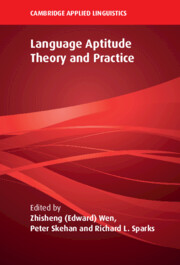Book contents
- Language Aptitude Theory and Practice
- The Cambridge Applied Linguistics Series
- Language Aptitude Theory and Practice
- Copyright page
- Contents
- Figures
- Tables
- Editors and Contributors
- Preface and Acknowledgments
- 1 Language Aptitude Research
- Part I Revisiting and Refining Aptitude Tests
- Part II Aptitude Testing of Diverse Groups
- 6 Testing Language Aptitude for Chinese Learners of Foreign Languages
- 7 Testing Language Aptitude for Recently Arrived Parent–Child Immigrant Dyads
- 8 Is Language Aptitude Immune to Experience?
- 9 Testing Language Aptitude
- Part III Innovative Perspectives and Paradigms
- Part IV Aptitude–Treatment Interaction (ATI)
- Part V Final Commentaries
- Index
- References
8 - Is Language Aptitude Immune to Experience?
Divergent Evidence from Bilingualism vs. Blindness
from Part II - Aptitude Testing of Diverse Groups
Published online by Cambridge University Press: 27 May 2023
- Language Aptitude Theory and Practice
- The Cambridge Applied Linguistics Series
- Language Aptitude Theory and Practice
- Copyright page
- Contents
- Figures
- Tables
- Editors and Contributors
- Preface and Acknowledgments
- 1 Language Aptitude Research
- Part I Revisiting and Refining Aptitude Tests
- Part II Aptitude Testing of Diverse Groups
- 6 Testing Language Aptitude for Chinese Learners of Foreign Languages
- 7 Testing Language Aptitude for Recently Arrived Parent–Child Immigrant Dyads
- 8 Is Language Aptitude Immune to Experience?
- 9 Testing Language Aptitude
- Part III Innovative Perspectives and Paradigms
- Part IV Aptitude–Treatment Interaction (ATI)
- Part V Final Commentaries
- Index
- References
Summary
In this contribution, we explore the question of whether there is reason to maintain the traditional view of language aptitude as a relatively fixed trait that is resistant to experience, or if it should instead be seen as a rather flexible and acquirable skill. Both bilingualism and visual loss have been reported to have enhancing effects on language-related as well as non-linguistic cognition, but few studies have focused on their effects on language aptitude specifically, especially in the case of blindness. In a study of 80 blind and sighted L1 and L2 speakers of Swedish, we compare the relative experiential effects on the phonological aptitude of (1) having learned an L2 and having been a long-term functional and fluent bilingual in adulthood with (2) having lived with total visual deprivation for a significant period of life. The chapter closes with a discussion on what it would mean for current views on the role of age of L2 acquisition and critical period(s) if the above-average language aptitude hitherto robustly associated with adult near-native L2 learning should turn out to be nothing but an effect of L2 learning itself.
Keywords
Information
- Type
- Chapter
- Information
- Language Aptitude Theory and Practice , pp. 176 - 207Publisher: Cambridge University PressPrint publication year: 2023
References
Accessibility standard: Unknown
Why this information is here
This section outlines the accessibility features of this content - including support for screen readers, full keyboard navigation and high-contrast display options. This may not be relevant for you.Accessibility Information
- 1
- Cited by
